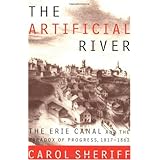
Average Reviews:

(More customer reviews)This book describes the complicated and fascinating social history of the canal that shrunk time and distance and transformed western New York, brought great wealth to many and opened up the west. But this progress came at a price and the book explores some of the paradoxes of progress.
The progress and transformation that the Erie Canal brought also brought a new set of challenges for residents and legislators. The canal split many farms causing great problems to many farmers who wanted bridges to get to their farms, the low bridges were a hazard to canal passengers and traffic. Water diverted for the canal and locks created water shortages though the region. Leaks in the canal caused flooding on some farms and created mosquito infested ponds, which were fertile grounds for malaria epidemics.
Cultural issues came to the forefront. Ditch diggers who lived in shantytowns, who drank and cusses, who tore down fences caused consternation among the inhabitants who feared that the county was creating a permanent underclass. When the digging was done and the diggers gone they were replaces with another underclass, the boat drivers, who drank, cussed, robbed and hored making the areas adjoining the canal crime-ridden.
This book takes you to the time when the canal was being built and is a joy to read.
Click Here to see more reviews about: The Artificial River: The Erie Canal and the Paradox of Progress, 1817-1862

No comments:
Post a Comment